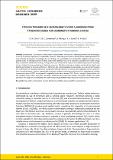| dc.description.abstract | Sustainability is a key factor which controls future leather manufacture. Developing several new technologies
is one of the primary agendas for sustainability. However, developing countries are facing several challenges which not
only limited to best practice technologies but also finding self-sustainability in maximizing the available resources. In the
present study, an attempt has been made to explore the potential resource of aluminium sulphate from kaolin of Pugu
hills, Tanzania for combination tanning. Though, extraction of aluminium sulphate from several resources are available,
there is limited literature pertaining to Tanzania resources. Therefore, aluminium sulphate extracted from kaolin was
basified and studied for its tanning efficiency. Diffraction and vibrational spectroscopic studies were carried out to assess
the confirmation of extracted aluminium. Combination tanning has been carried out with vegetable tannins, which are
from natural resources. Leathers tanned with aluminium sulphate and mimosa resulted with a hydrothermal stability
temperature beyond 100℃ as compared to vegetable tannin alone showed 78℃. Physical strength characteristics met
the standard norms. Fiber separation was good, which has been confirmed through microscopic studies. The study
provides a new insight on accomplishing self-sustainability through available resources and manufacture eco-friendly system, | en_US |

